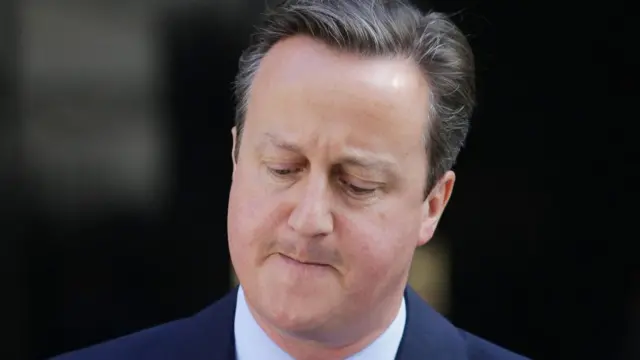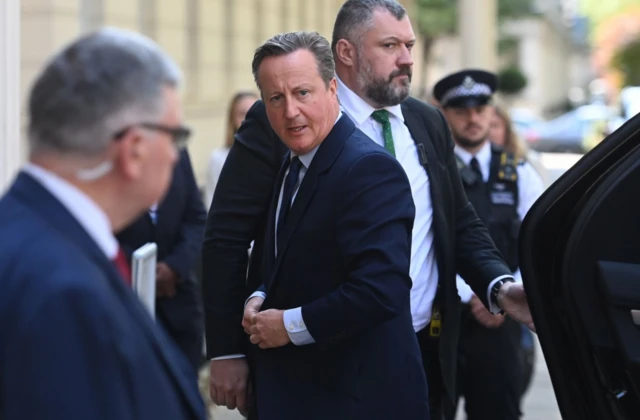David Cameron begins speakingpublished at 11:03 BST 19 June 2023
Former Prime Minister David Cameron is taking questions now as the second week of the UK's Covid-19 inquiry begins.
The head of the Department for Health and Social Care says pandemic planning focused on flu as it was considered "more likely"
Sir Chris Wormald's comment comes after former Prime Minister David Cameron told the Covid Inquiry planning only for flu was "a mistake"
Cameron says his government should have been spent more time preparing for other pandemics
The doctors' union, the BMA, has said Cameron's austerity policies left the country badly prepared
The UK Covid-19 Inquiry is into the second week of public hearings for the first part of its investigation
Clara Swinson who heads up global health at the Department for Health is also due to give evidence
Last week the inquiry was told that planning for a pandemic had been "wholly inadequate" and a future outbreak is inevitable
Edited by James Harness
Former Prime Minister David Cameron is taking questions now as the second week of the UK's Covid-19 inquiry begins.
Former Prime Minister David Cameron is about to begin giving his evidence to the inquiry.
You can watch along live by hitting the play button at the top of the page.
Stay tuned, we'll be bringing you the key lines.
 Laura Foster
Laura Foster
Health reporter at the Covid inquiry
There are police officers outside Dorland House in Paddington today - for last week’s witnesses there hadn’t been a need. But when a former prime minister is giving evidence, security is increased.
David Cameron arrived just after 09:30 this morning even though he’s not due to start giving evidence until 11:00.
Questions were thrown at him by the gaggle of reporters waiting outside but none were answered.
Last week, scientists stated that the UK had entered the pandemic in 2020 ‘depleted’ following cuts to health and social care.
As David Cameron was prime minister between 2010-2016, his response to those comments will be interesting to see.
It’s expected that a lot of today’s hearing will focus on the policy of austerity implemented by David Cameron during his time as prime minister.
Cameron committed to reducing government spending in 2010, implementing what he called “the age of austerity”.
Cuts were introduced in welfare spending, school building programs, local government, police, courts and prisons.
Various campaign groups have released reports showing the disproportionate impact the policy had on groups including women, children, people of colour and pensioners.
A key focus today will be on the NHS.
A report prepared jointly by Prof Sir Michael Marmot, director of University College London's Institute of Health Equity, and Prof Clare Bambra, an expert in public health from Newcastle University, said austerity policies affected the health of the nation in the lead up to the pandemic.
Today, we will likely hear evidence about whether austerity-era decisions left the UK unprepared for a pandemic.
Matthew Cole
Reporting from the Covid inquiry
 Image source, PA Media
Image source, PA MediaIt’s been a running story for days, as the Boris Johnson partygate row draws to a (possible) conclusion.
But this morning it’s time for Covid and the other ex-prime minister.
In last week’s sessions here at the official Inquiry, a running theme emerged, with those addressing the hearing suggesting the austerity policies of David Cameron’s government left the NHS too weakened to face the pandemic.
When in office the former PM would regularly end news interviews by simply walking off camera.
That won’t be an option today and he’ll have to sit and face potentially hostile questions from barristers representing the core participants - including doctors, union members, and the families of those who died.
Cameron’s Chancellor George Osborne and his long serving Health Secretary Jeremy Hunt will both give evidence in the coming days - potentially more awkward for the latter as he now occupies No 11 Downing Street.
The politics of austerity, of the coalition’s cuts, might seem of days gone by, but their consequences for recent events, not least in terms of lives lost will very much be the focus of today.
The public inquiry into the government's handling of the coronavirus pandemic started last Tuesday.
It was launched by Boris Johnson in May 2021, and it will cover decision-making in Westminster and the devolved administrations in Wales, Scotland and Northern Ireland.
You might be wondering what the overall aim of a public inquiry is? Well, it aims to respond to "public concern" about events - in this case.
Any inquiry has the power to make people appear as witnesses, and to provide evidence. Inquiries are expected to publish conclusions and may make recommendations.
 Image source, PA Media
Image source, PA MediaFormer Prime Minister David Cameron has arrived at the Covid inquiry.
He'll be speaking from 11:00, and we will bring you the key moments here.
Stay with us.
In his opening statement, counsel for the inquiry Hugo Keith KC described the “death, misery and incalculable loss” caused by coronavirus, saying the UK may not have been well prepared “at all”.
Meanwhile a lawyer for the Department of Health and Social Care called the pandemic “a confused period akin to war”.
Fiona Scolding said she wouldn’t argue the government got everything right in its response to Covid but that the pandemic had been the "greatest challenge ever faced by the NHS and care sector".
Infectious diseases and risk and disaster experts also addressed the inquiry, including Prof David Alexander, who said another pandemic caused by a new disease was “an inevitability” and that “large elements” of the Covid pandemic had been “entirely predictable".
Former senior civil servant Bruce Mann said preparations for a no-deal Brexit took up time and energy that could have been used for pandemic planning. He and Alexander also criticised the government’s emergency plan and said they wanted to see a "wholesale, radical, rewriting" of the government's approach.
It’s a big week for the UK Covid-19 public inquiry with a number of high-level politicians and health officials set to make an appearance.
First up today we’ll hear from Conservative former Prime Minister David Cameron, who’ll be questioned about the extent of resilience planning during his time in office from 2010 to 2016.
Later we'll hear from Sir Chris Wormald, permanent secretary at the Department of Health and Social Care (DHSC), and Clara Swinson, director general for global health at the DHSC.
This is just the second week of the first phase of this inquiry, which is focusing on the UK's preparedness for a pandemic before Covid hit.
Stay with us for the latest news updates and analysis - and you can watch live by pressing play above from 11:00.